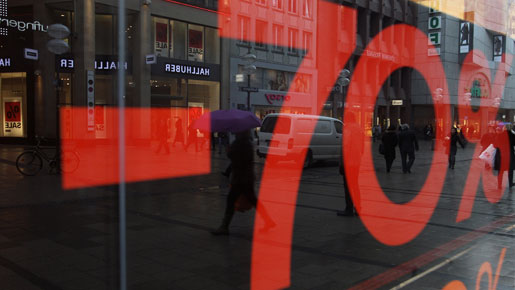
The Munich-based Ifo think tank said its business climate index, based on a monthly survey of some 7,000 firms, rose to 98.1 from 95.2 in February. The rise beat the consensus forecast for 95.8, surpassing all forecasts and prodding the euro briefly higher.
A separate survey of Eurozone purchasing managers showed manufacturing activity grew in March at its fastest rate since the end of 2006 while the dominant service sector expanded at its quickest pace in over two years.
Markit’s Purchasing Managers’ Indexes (PMI) for the 16-nation bloc showed a bumper month as manufacturing activity in Germany, its biggest economy, expanded at its fastest rate in 10 years and at the quickest rate in over three years in France.
“It looks like a strong second quarter will follow a weak half year over winter,” said DekaBank economist Andreas Scheuerle.
Markit’s Eurozone Flash Manufacturing index jumped to 56.3 in March from 54.2 in February, beating forecasts for 54.0, while the output index climbed from 57.0 in February to 59.7 this month, a level it has only beaten once since July 2000.
The services PMI, made up of surveys of around 2,000 businesses ranging from banks to hotels, bounced to 53.7 in March from 51.8 in February, not seen since November 2007.
Eurozone government bond futures turned negative after both sets of data were stronger-than-expected.
Post-war low
The Eurozone economy escaped from its worst post-war recession in the third quarter of 2009 and Markit said the PMI figures were consistent with growth in the current quarter of 0.5 percent. According to a poll it will grow 0.4 percent per quarter well into 2011.
Ifo economist Klaus Abberger said Germany’s economic recovery is firming on a broad basis and the construction and retail sectors are experiencing a spring pickup.
The German economy emerged from its deepest post-war recession in the second quarter of last year before stalling in the final three months of 2009.
Other recent economic data have suggested the German economy struggled to grow at the start of this year, with business confidence falling for the first time in almost a year in February.
German exports also posted their biggest drop in a year in January, throwing the economy’s main growth engine into reverse at the start of 2010, but a surge in orders suggests the decline will be temporary.
Ifo said a brightening of the business climate was evident across all surveyed sectors of the Germany economy. An Ifo index on current conditions rose to 94.4 from 89.8. An expectations index rose to 101.9 from 100.9.
“The relative weakness of the euro is a boost,” said SEB bank analyst Klaus Schruefer. “I would still not talk about a self-sustaining recovery … From firms’ point of view, it’s still too early to be making noteworthy investments.”

